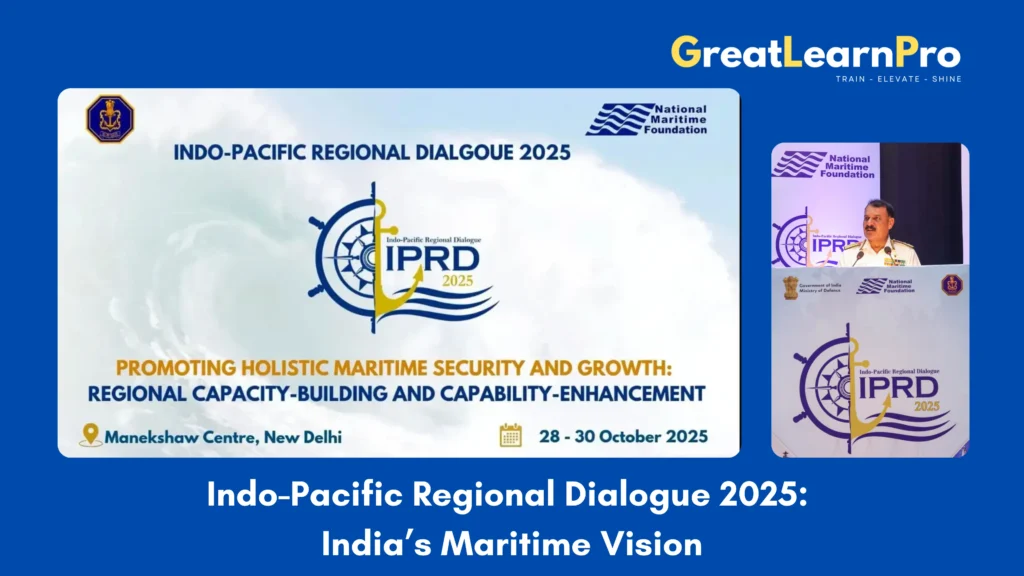The Indo-Pacific Regional Dialogue (IPRD) is a flagship annual conference organised by the Indian Navy in collaboration with leading maritime institutions and think tanks. It serves as a high-level platform for global dialogue on the evolving security, economic, and ecological dynamics of the Indo-Pacific region. Since its inception in 2018, IPRD has grown into a pivotal gathering of senior policymakers, naval officers, academics, and industry leaders from across the Indo-Pacific and beyond.

Origins and Purpose
The IPRD emerged in recognition of the Indo-Pacific’s growing importance in global geopolitics. For India, the region from the eastern coast of Africa to the western shores of the Americas is not merely a maritime space but a strategic arena of connectivity, security, and economic opportunity.
The primary objectives of IPRD are:
- To review and shape maritime strategy in the Indo-Pacific, focusing on security, connectivity, and sustainability.
- To enable dialogue across government, navy, academia, and industry on emerging maritime challenges and cooperative responses.
- To advance India’s broader maritime vision captured under frameworks such as SAGAR (Security and Growth for All in the Region) and link it with regional and international partners.
Thematic Evolution and Key Agendas
Over the years, IPRD has evolved to reflect the shifting dynamics of the Indo-Pacific. Each edition has highlighted a particular aspect of the region’s maritime landscape:
Security and Strategy:
The initial editions of IPRD focused on broad maritime security issues, emphasising freedom of navigation, the rule of law at sea, and cooperation in combating piracy, smuggling, and other non-traditional threats. Discussions highlighted how the Indo-Pacific had become a focal point of strategic rivalry among major powers, particularly in the context of the U.S.-China competition.
Connectivity and Trade:
Subsequent editions of the dialogue explored how maritime trade and infrastructure projects influence the strategic balance in the Indo-Pacific. The focus was on enhancing regional connectivity through resilient supply chains, port development, and secure sea lanes of communication, which are vital for global commerce.
Holistic Maritime Security:
The recent editions have adopted a more comprehensive approach to maritime security. The 2025 edition, themed “Promoting Holistic Maritime Security and Growth: Regional Capacity-Building and Capability-Enhancement,” brought together representatives from over 30 countries. It stressed collective capacity-building, blue economy development, and cooperation with island nations to enhance maritime awareness, disaster management, and ecological balance.
India’s Strategic Role and Vision
India positions itself as a leading maritime power in the Indo-Pacific, advocating for an inclusive and rules-based regional order. Defence Minister Rajnath Singh has repeatedly underlined India’s commitment to peaceful resolution of disputes, respect for the United Nations Convention on the Law of the Sea (UNCLOS), and partnerships based on mutual respect and collective progress.
Through the IPRD, India also advances its twin maritime frameworks SAGAR and the Indo-Pacific Oceans Initiative (IPOI) as guiding principles for regional cooperation. These frameworks emphasise maritime security, marine ecology, blue economy, capacity building, disaster risk reduction, and science and technology collaboration. IPRD provides the institutional setting to translate these ideas into actionable cooperation among partner countries.
Why It Matters: Regional Implications
- Maritime Security Architecture:
The Indo-Pacific is witnessing increasing tensions over maritime boundaries, illegal fishing, and freedom of navigation. IPRD’s emphasis on “holistic maritime security” encourages collaborative solutions and capacity-building across navies and coast guards. - Trade and Connectivity:
The Indo-Pacific accounts for a majority of global trade flows. The dialogue explores how to strengthen resilient maritime trade routes and develop digital and physical infrastructure that supports open and secure connectivity. - Blue Economy and Sustainability:
Oceans are becoming central to the global economy, providing food, energy, and trade routes. IPRD’s discussions on the blue economy, seabed infrastructure, and climate-friendly maritime practices highlight India’s commitment to sustainable growth. - Capacity Building and Inclusivity:
Many smaller island and coastal states lack the resources to patrol their waters or build port infrastructure. The dialogue encourages partnerships that enable these nations to strengthen governance, technology sharing, and maritime domain awareness. - India’s Diplomatic Leverage:
Hosting IPRD enhances India’s image as a responsible maritime power and security provider. It allows New Delhi to shape narratives, influence maritime policy, and promote cooperation that aligns with its national and regional interests.
Challenges and Critiques
Despite its significance, the IPRD faces some challenges:
- Implementation Gap: While discussions are rich in ideas, converting them into concrete initiatives such as joint exercises or maritime agreements remains a challenge.
- Diverse Interests: The Indo-Pacific encompasses countries with different economic capacities and strategic interests. Building consensus on maritime laws, climate action, and resource management can be complex.
- Emerging Threats: As new challenges arise—such as cyber threats, underwater espionage, and unmanned maritime systems—the dialogue must continually adapt its focus and expertise.
- Geopolitical Rivalry: The increasing rivalry among major powers risks politicising the forum. Ensuring that the IPRD remains inclusive, cooperative, and non-aligned is crucial for its success.
Looking Ahead
The future of IPRD lies in translating ideas into action. Strengthening collaboration between navies, industry, and academia can enhance maritime innovation and shared learning. Including more participants from Pacific island nations and African littoral states can broaden the dialogue’s inclusivity.
IPRD can also synergise with other regional frameworks like the Indian Ocean Naval Symposium (IONS), ASEAN-led platforms, and the Quad’s maritime initiatives to establish a comprehensive Indo-Pacific maritime security architecture. As the region moves deeper into the era of technological transformation and climate challenges, IPRD’s role in shaping coordinated responses will become even more vital.
Conclusion
The Indo-Pacific Regional Dialogue represents India’s vision of the Indo-Pacific as a region of peace, prosperity, and shared responsibility. Beyond a mere conference, it is a manifestation of India’s maritime diplomacy and strategic foresight. By fostering dialogue on maritime security, trade, sustainability, and inclusivity, the IPRD contributes to a stable and rules-based Indo-Pacific order.
As maritime challenges multiply in complexity from strategic rivalries to environmental degradation the IPRD stands as a beacon of cooperation, promoting India’s role as both a stakeholder and a steward of the Indo-Pacific’s future.
Sources:
- https://indianexpress.com/article/india/maritime-security-cant-be-confined-to-threat-containment-says-navy-chief-10332958/?utm_
- https://sundayguardianlive.com/news/indo-pacific-stability-inseparable-from-indias-national-well-being-158038/?utm_
- https://newsarenaindia.com/nation/iprd-25-navy-s-indo-pacific-apex-level-int-l-dialogue-begins/60517?utm_
More Current affairs: https://learnproacademy.in/updates/
